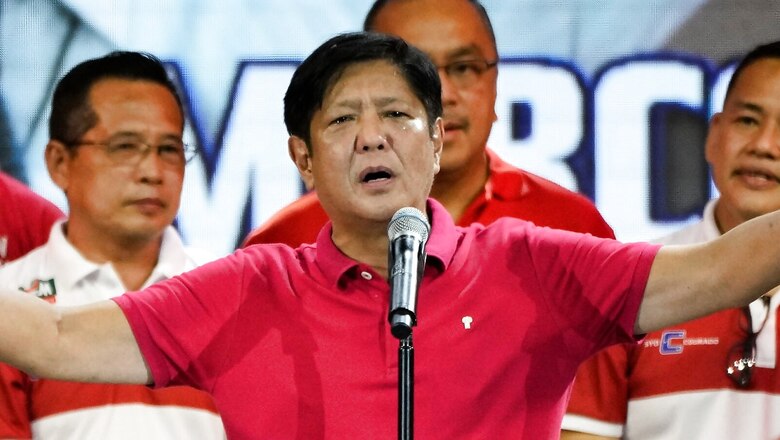
views
While the US and its European allies scramble to contain Russia in Ukraine, China also has shifted its focus eastwards (rather towards its southeast) to expand its sphere of influence.
The Quad and AUKUS, which were formed in order to ensure a free and inclusive Indo-Pacific, is on its way to suffering another setback as the Philippines is likely to elect Ferdinand Marcos Jr., son of late dictator Ferdinand Marcos Sr., who has tilted towards China even before being elected.
The Philippines shares strong relations with Quad member US as both nations are signatories of the 1951 US-Philippines Mutual Defence Treaty and participate in military drills every year.
The Philippines also has built close strategic, defence and economic ties with other Quad nations lately.
But outgoing president Rodrigo Duterte was ready to ditch the US and side with China. Even Marcos Jr.’s stance is similar to what Duterte foreign policy was vis-a-vis China. It would not be wrong to say that they are increasingly pro-China.
What should concern Filipinos is that both leaders are ready to negotiate their nation’s stance with regard to the territorial dispute in the West Philippines Sea.
Chinese vessels even pointed radar guns and sprayed water cannons on Filipino vessels despite the arbitration victory at The Hague in 2016 that repudiated Beijing’s expansionist claims in the region.
At one point, Duterte was ready to break ties with the US, since it was critical of his war on drugs, which have led to the deaths of innocents in Manila and elsewhere.
Alvin Camba, who teaches in University of Denver, while writing for Nikkei Asia pointed out that ‘China will be perfectly placed to help the Marcos family to consolidate their political power in the coming decades’.
He says that the Marcos family in turn will use Chinese commercial opportunities to reward local elites who would side with them and attract investments in their home province of Ilocos Norte.
This will increase China’s soft power within the Philippines.
He cites that the foundation for this was laid in 2007 when the Chinese foreign ministry established a consulate in Laoag in 2007.
Under the guise of facilitating commercial and investment relations in Laoag and surrounding regions it hosted dinners, ceremonies and fundraisers which allowed Chinese state officials and investors to work with Marcos’ and also build relations with the provincial elites of Cagayan, Pangasinan, Abra and Isabela regions.
He also lists incidents like gifting ambulances to city administration and developing ties between universities which show that Marcos is eager to move towards China despite the issues with the South China Sea.
Duterte arguably has laid the foundations for closer Manila-Beijing ties, so much so that he did not care about the sovereignty of the Philippines as well as the nation’s legitimate territorial claims.
Nikkei Asia in a separate report highlighted another incident where a Philippines’ company was asked to halt oil and gas exploration in the West Philippine Sea (or South China Sea) region as Duterte and Xi were to meet. Later both leaders agreed that both nations together would explore for energy reserves in the region.
Duterte, in 2019, described the situation in the South China Sea as a “delicate balancing act”. It is likely that Ferdinand Marcos Jr. aka ‘Bongbong’ is likely to follow the same route.
Read all the Latest News here
















Comments
0 comment